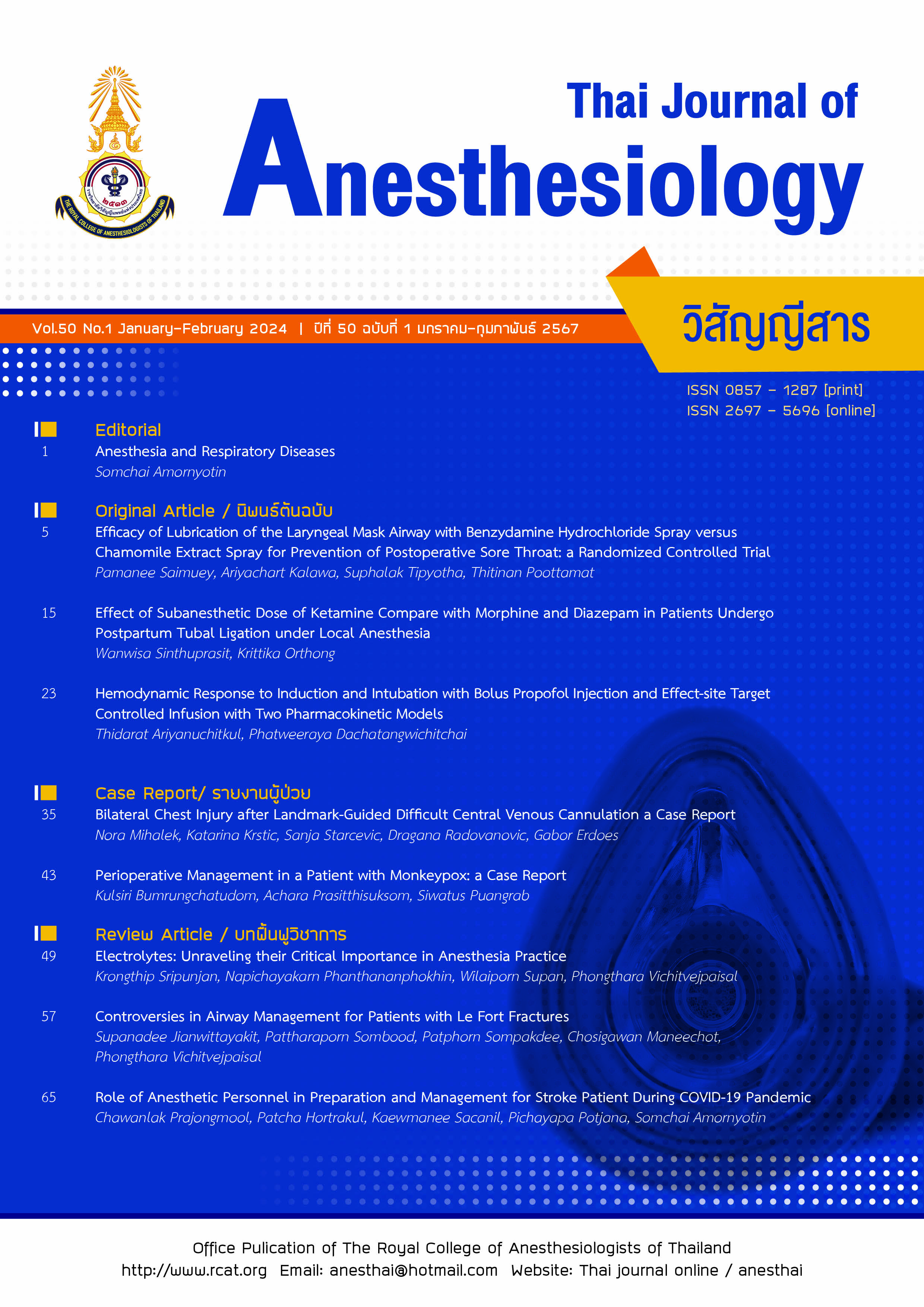Electrolytes: Unraveling their Critical Importance in Anesthesia Practice
Main Article Content
Abstract
This article explores the critical significance of electrolytes in anesthesia practice and their impact on patient outcomes. It provides a comprehensive overview of electrolytes and their role in the human body, emphasizing their essential functions in maintaining physiological processes. It highlights the implications of electrolyte imbalances during the perioperative period and their potential effects on cardiac function, neuromuscular function, wound healing, and organ function. Strategies for monitoring, managing, and optimizing electrolyte balance in anesthesia practice are discussed. The article also presents the critical importance of maintaining electrolyte balance and the need for timely interventions during anesthesia practice. Additionally, future directions in electrolyte monitoring, emerging research areas, and the critical role of electrolytes in anesthesia practice and patient outcomes are explored.
Article Details

This work is licensed under a Creative Commons Attribution-NonCommercial-NoDerivatives 4.0 International License.
References
Shrimanker I, Bhattarai S. Electrolytes. StatePearls. 2023 [update 2023 Apr 23]. Available from: http://www.ncbi.nlm.nih.gov/books/NBK541123/.
Rassam SS, Counsell DJ. Perioperative electrolyte and fluid balance. Cont Educ Anaesth Crit Care Pain. 2005;5:157-60.
Morris AL, Mohiuddin SS. Biochemistry, Nutrients. StatPreals. 2023 [update 2023 May 1; cited 2023 Jul 28]. Available from: http://www.ncbi.nlm.nih.gov/books/NBK554545/
Leung AA, McAlister FA, Rogers SO, Pazo V, Wright A, Bates DW. Preoperative hyponatremia and perioperative complications. Arch Intern Med. 2012;172:1474-81.
Qian Q. Hypernatremia. Clin J Am Soc Nephrol. 2019;14:432-4.
Castro D, Sharma S. Hypokalemia. StatPearls. 2023 [cited 2023 Jul 28]. Available from: http://www.ncbi.nlm.nih.gov/books/NBK482465/.
Simon LV, Hashmi MF, Farrell MW. Hyperkalemia. StatPearls. 2023 [update 2023 Feb 19; cited 2023 Jul 28]. Available from: http://www.ncbi.nlm.nih.gov/books/NBK4702843/.
Diringer M. Neurologic manifestations of major electrolyte abnormalities. Handbook of clinical neurology. 2017 [cited 2023 Jul 28]. p705-13. Available from: https://pubmed.ncbi.nlm.nih.gov/28190443/.
Hahn RG. Fluid and electrolyte physiology in anaesthetic practice. In: Hardman JG, Hardman JG, Hopkins PM, Struys MMRF, editors. Oxford Textbook of Anaesthesia: Oxford University Press. 2017 [cited 2023 Jul 28]. p49-58. Available from: https://academic.oup.com/book/30062/chapter-abstract/256303597?redirectedFrom=fulltext&login=true.
Mauricio Del Rio J, Nicoara A, Swaminathan M. Neuroendocrine stress response: implication for cardiac surgery-associated acute kidney injury. Rom J Anesth Intensive Care. 2017;24:57-63.
Wagner J. The positives and negatives of preoperative electrolyte disturbances. South African J Anaesth Analg. 2021;27:126-30.
Marx G, Meybohm P, Schuerholz T, et al. Impact of a new balanced gelatine on electrolytes and pH in the perioperative care. PLoS One. 2019;14:1-15.
National Clinical Guideline Center. Intravascular fluid therapy: intravenous fluid therapy in adults in hospital. London: Royal College of Physicians; 2013 [cited 2023 Jul 28]. Available from: https://pubmed.ncbi.nlm.nih.gov/25340240/.
Muhsin SA, Mount DB. Diagnosis and treatment of hypernatremia. Best Pract Res Clin Endocrinol Metab. 2016;30:189-203.
Arampatzis S, Funk GC, Leichtle AB, et al. Impact of diuretic therapy-associated electrolyte disorders present on admission to the emergency department: a cross-sectional analysis. BMC Med. 2013;11:1-6.
Wenwen X, Jing Y, Yingchao S, Qinglu W. The effect of magnesium deficiency on neurological disorders: a narrative review article. Iran J Public Health. 2019;48:379-87.
Subramaniam T, Fauzi MB, Lokanathan Y, Law JX. The role of calcium in wound healing. Int J Mol Sci. 2021;22:6486.
Goyal A, Daneshpajouhnejad P, Hashmi MF, Bashir K. Acute kidney injury. StatPearls. 2023 [cited 2023 Jul 28]. Available from: http://www.ncbi.nlm.nih.gov/books/NBK441896/
Simpson R, Quayle J, Stylianides N, Carlson G, Soop M. Intravenous fluid and electrolyte administration in elective gastrointestinal surgery: mechanisms of excessive therapy. Ann R Coll Surg Engl. 2017;99:497-503.
Wagner J. The positives and negatives of preoperative electrolyte disturbances. South African J Anaesth Analg. 2021;27:126-30.
Bennet D, Khorsandian Y, Pelusi J, Mirabella A, Pirrotte P, Zenhausern F. Molecular and physical technologies for monitoring fluid and electrolyte imbalance: a focus on cancer population. Clin Transl Med. 2021;11:1-22.
Freshwater DT. Sodium, potassium and the anaesthetist. World Anaesthesia Tutorial of the week. 2005 [cited 2023 Jul 28]. Available from: https://resources.wfsahq.org/atotw/sodium-potassium-and-the-anaesthetist/
Kwon JM, Jung MS, Kim KH, et al. Artificial intelligence for detecting electrolyte imbalance using electrocardiography. Ann Noninvasive Electrocardiol. 2021;26: e12839.
McClelland M. IV therapies for patients with fluid and electrolyte imbalances. Medsurg Nurs. 2014;23:S4-8.


